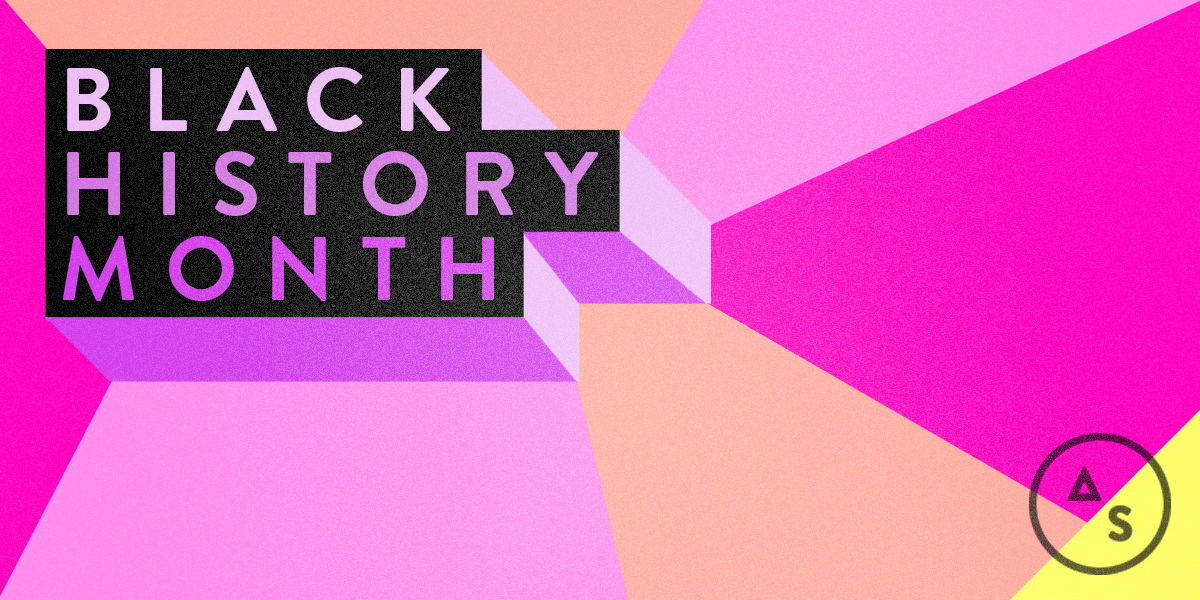
This is the second and final installment of Autostraddle’s Black History Month Roundtable series, where some of black writers on staff have gotten together to explore what this month means to us as queer and trans black people.
In part one of the series, we discussed how we were taught black history as children, along with brainstorming new ways that approaches to the study of black history and the celebration of Black History Month could be more inclusive of QTPOC black people.
Now we are ready to look forward. We’re asking ourselves, what are our hopes for black queer futures? What steps can we and our allies take in helping those hopes and dreams become reality?
Neesha, Staff Writer
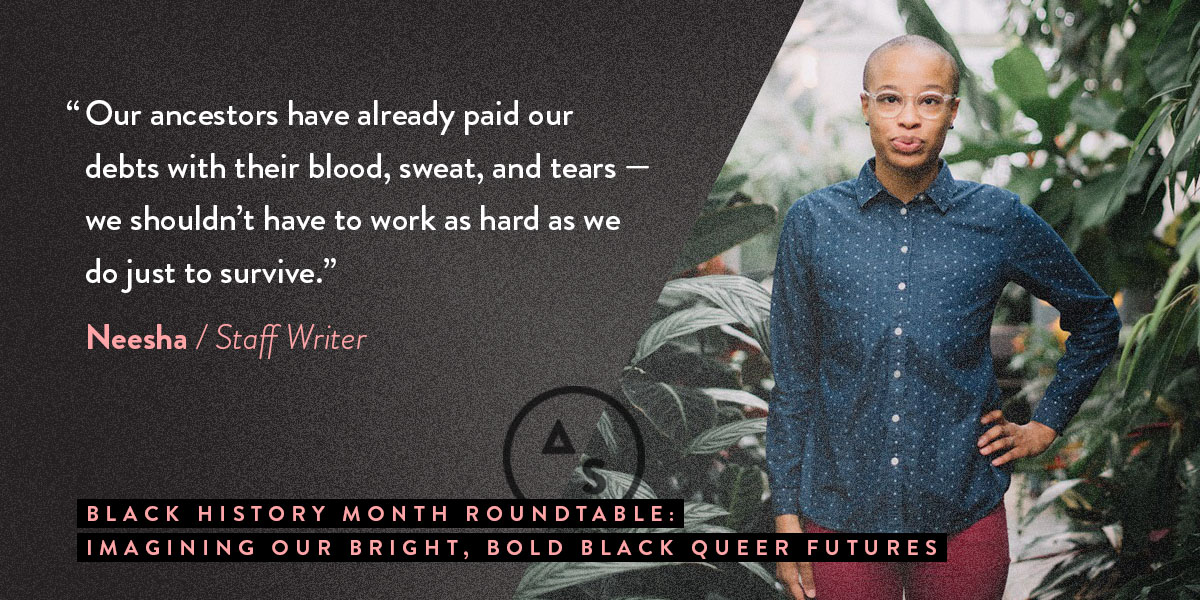
I want Black trans, non-binary, and queer folks to have the freedom and resources to do what the hell we want with our futures. My ancestors labored for white people in this country for free. My wife’s ancestors’ land in Rwanda was colonized by both Belgium and Germany. Our ancestors have already paid our debts with their blood, sweat, and tears—we shouldn’t have to work as hard as we do just to survive. Both of us have struggled for jobs and housing because we live in a white supremacist heteropatriarchal society. Both of us have been unjustly impacted by the Prison Industrial Complex, and our communities are facing unprecedented violence. Instead of these circumstances, we deserve futures that include reparations and abundance. This is the vision I’m constantly working towards in both my community organizing and my writing.
For Black trans, non-binary, and queer futures to be bright, we need our cisgender and heterosexual Black peers to treat us more humanely. No more making us the butt of your jokes. We need them to know that being trans and/or queer has never been just “a white thing.” Furthermore, the lives of Marsha, Audre, and Bayard prove that we’ve been leading Black liberation movements in the United States for at least a century. I want my people to recognize that ALL Black lives matter, not just cishet ones.
We need non-Black people of color to actively challenge anti-Blackness within their communities and to refrain from co-opting our struggles. The same goes for white people, but in addition, we also need them to redistribute their unearned positions and resources. Black trans and queer futures depend on white people recognizing that white privilege is real and then actually doing something about it.
Alexis, Staff Writer
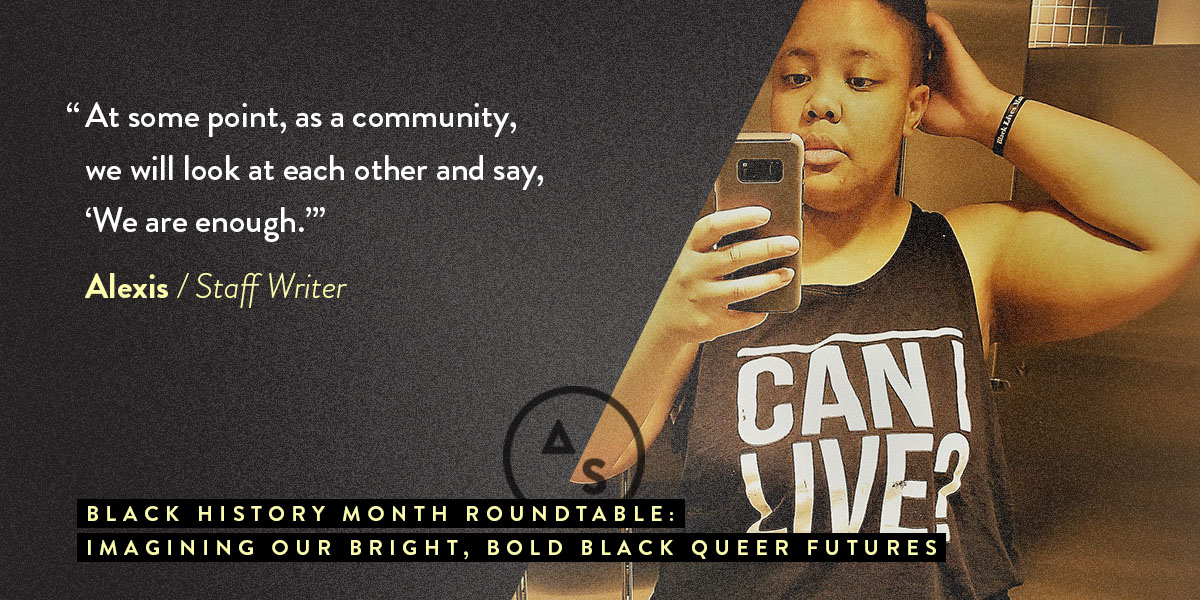
At some point, as a community, we will look at each other and say, “We are enough.”
We will be invited to the white tables and we won’t settle for them. We won’t rejoice with a “Finally!” that we never needed. We will let the invitation get lost in the mail because we have moved beyond whatever scraps they tell us is a banquet. There will still be a hatred towards us, of course, if they don’t do the work to unlearn it, but we won’t have to worry or crumble under the weight of their ignorance.
We will defend one another and keep each other safe and if this world refuses to rise to the occasion, we will build a new one and rise to the occasion ourselves. We will be able to tell our children the stories of how we were stolen, on the receiving end of the worst of human cruelty. Then our children will look at their present — with the safety and knowledge that they are worthy, that we have always been worthy of good things, and they will be able to tell themselves the story of our people, of how we survived and made ourselves stronger, even when so many were against us living as ourselves, when so many were against us even making it this far.
They’ll hear of the days we were terrified to leave our houses, but we did it anyway. Not every day, but enough to make sure we did not turn ourselves ghost, turn ourselves invisible, turn ourselves into fear walking. They will know that we fought and that it was not always enough. They will hear how the only thing that sustained us was that which was in us all along, that the only way we were able to move forward was together, to make sure no one was left behind.
The problem with small steps is that sometimes I just want to already be at the destination. I want to already be at the place where we don’t fear for our lives and we’re able to live and that be enough. But, I know that just saying that it out loud doesn’t move us any closer towards our freedom. So. This is for white people: Listen. Learn to be a guest. Instead of forcing yourselves into our community, wait for an invitation. If no invitation comes, accept that gracefully, and live your own life in a way that doesn’t harm others, that doesn’t harm us, and isn’t solely focused on revenge. Listen. Listen. Listen. If we don’t ask for your opinion, do not offer it up. Learn that the world is big enough for all of us and that you do not need to be the center of ours just for us to see you. Don’t just speak about it, be about it. Do the work.
For non-black people of color, stop kicking us down to put yourselves ahead. Remember that we are not each other’s enemy. That fighting for ourselves absolutely doesn’t mean we’re fighting against you. That we all have things we need to learn and unlearn. We cannot hate each other for that.
For black (cis/ straight) people, stop trying to make us “black enough”. Queer black people are black enough even if we exist in a way you refuse to understand. Learn that we are fully cognizant of what it means to be black and queer, we don’t need your lessons in how to make ourselves smaller to survive. We’ve lived that life long enough and don’t need the people who are supposed to love us, hurting us instead. If you cannot love us, do not pretend that you can “someday”. To quote Toni Morrison, “Love is or isn’t. Thin love ain’t love at all”. If you cannot love us, do some work and figure out why and fix it. We all have work to do, and black queer people are doing our part, don’t leave us to suffer because you refuse to do your own. If you cannot love us, let us go find the ones who can and will.
Queer black people, please stay with us. Please learn to leave the table when love is no longer being served. Please know you are allowed to be full and loved in a way that does not destroy you. Please grow and continue to be your best selves. Please reach out and understand that you are worth every good thing. You deserve to be here and you deserve community that loves you, especially in a ways that help you become a better person. You deserve to live. You deserve good love. We are here and we are waiting to love you full if you are ready.
I don’t remember this every day and that is okay. I learn to let the good love leak in a little more as much as I can. It’s okay if you cannot do this all at once. We are not meant to do this all at once. But if you have space to let yourself love a little more, be loved a little more, stay present a little longer, please do it. The steps are small but they keep you growing, they keep you going and any movement forward is better than none at all. I love you very much.
Reneice, Staff Writer
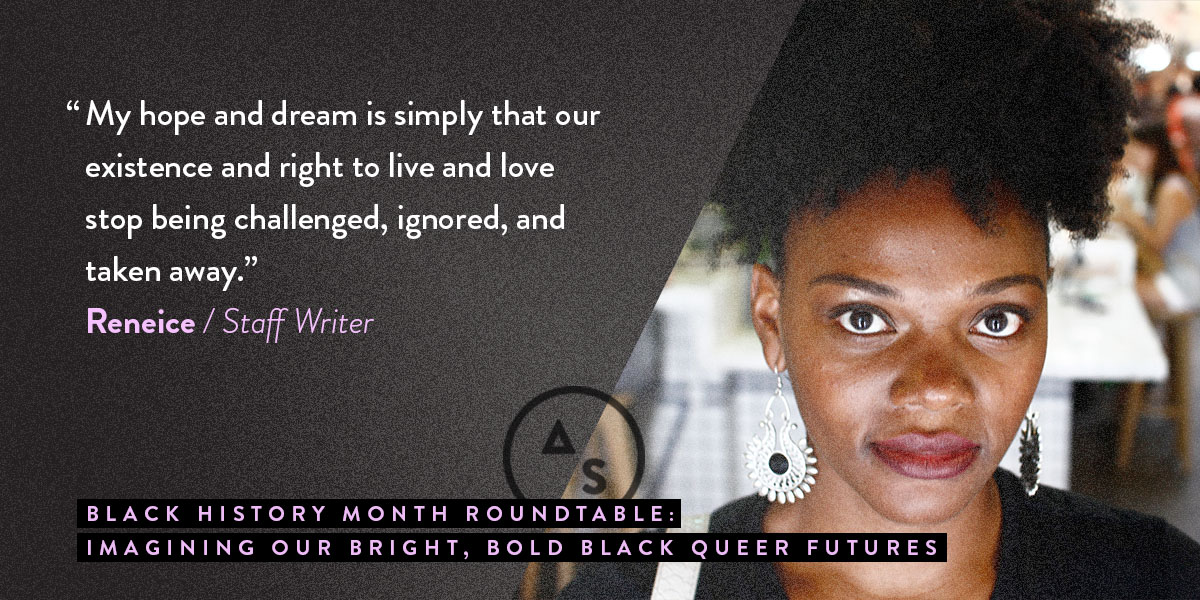
My hope and dream is simply that our existence and right to live and love stop being challenged, ignored, and taken away. How sad that my wildest hope is something others already enjoy.
Abeni, Staff Writer
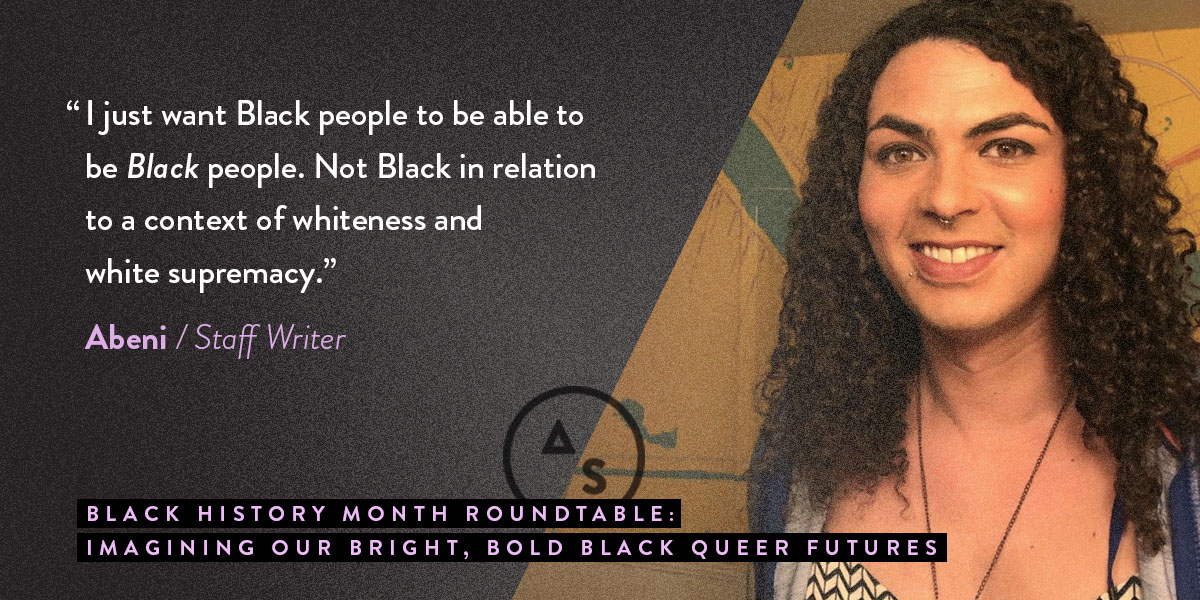
I just want Black people to be able to be Black people. Not Black in relation to a context of whiteness and white supremacy. Not Black in relation to the stereotypes and tropes and media portrayals of us. Not in relation to colonization and slavery. Mainstream global understandings of Blackness have always been comparative— we’ve always been defined in relation to others. In America, we’ve always been the most non-white of all the non-white people. Black men have been told that they’re the most savage, compared to the white gentleman. Black women are described as the most licentious, compared to the white pure chaste feminine ideal. What I’m saying is Black people have always been queer; we’ve always been outsiders. But, so often we fight for assimilation, saying “we’re just like white people.” We aren’t and we don’t have to be. Let us be Black!
Carmen, Staff Writer
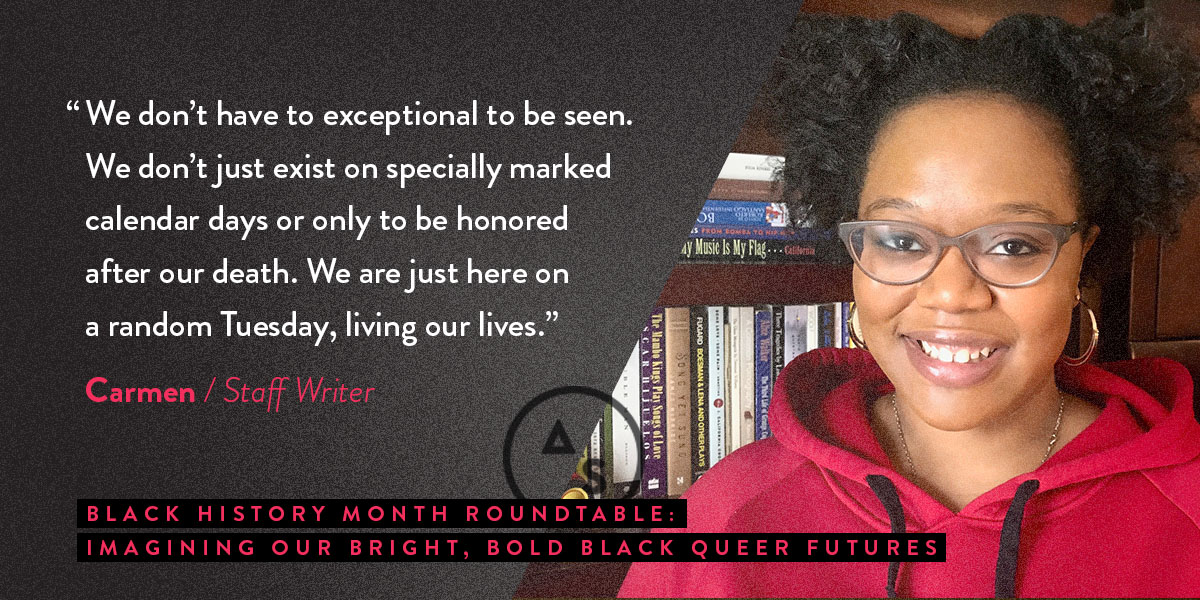
First thing out of the way, I want us to live. That’s my baseline hope and dream for the future, that we are here to see it. This Black History Month alone, we have already lost two black trans sisters to violence, and black trans women and trans women of color remain the largest targeted group of anti-LGBT hate crimes in this country. If my sisters can’t walk home at night without feeling safe in this world, we are not free. Recent studies find that roughly 43% of black LGBT youth have thought about suicide. So my first dream is that we keep surviving; it’s cliché, but I do believe in Martin Luther King’s axiom that as long as we keep working towards it, “the arc of the moral universe is long, but bends toward justice”. I want us here to see it. We deserve to be here to see it.
I also want for us to have financial security, social and legal equality. I want for us to no longer be subjected to a second-class citizenship in this country. Ok, so those necessities out of the way (because I’m just getting started). What’s my next, biggest, wildest dream?
I want a black lesbian pop star. I want a bisexual Serena Williams. A black, queer, feminist Supreme Court Justice. I want to see us reflected in at every level, in every color of the sun. You know the scene in The Lion King where Mufasa tells Simba that everything the light touches will be his? I want THAT. I want everything that has ever been given to a mediocre straight white man for just waking up in the morning. I’m here for taking it all.
Maybe that all sounds over the top, but I’m ready to dream past our survival. I’m ready to imaging our thriving. I’m ready for our unbridled joy, for our laughter, for our love. While we’re at it, I’m here for black queer and trans folks to have some really, really good sex. And delicious food! Finger-licking good food. Everyday. I want for us to have the best of what life has to offer.
When it comes to people who aren’t QTPOC black folks, and how they can help us turn our dreams into reality, I think that starts with recognizing our everyday humanity. It’s a much bigger deal than it seems. If you aren’t black, you shouldn’t only think about black people during February, or when a police officer shoots someone unarmed. If you’re a cis or heterosexual black person, even one who considers yourself our ally, you shouldn’t only think about queer or trans black people when Laverne Cox gets a magazine cover. We don’t have to exceptional to be seen. We don’t just exist on specially marked calendar days or only to be honored after our death. We are just here on a random Tuesday, living our lives. We are funny and sexy and a lot of times we are just average. We’re boring. Seeing us for the full, mundane picture— I think that’s where understanding and acceptance starts. That’s where we can build allyship from.
Last thing, for my black, queer, trans and non-binary family, I love you. I love you without seeing you. I’m rooting for you, and for us. Take solace in my love. Imagine I just gave you a hug— if that’s your thing— or offered you a chocolate chip cookie. Your hair looks awesome today. I love that outfit you put together! It’s hard out there, I know. But that’s OK. Take care of yourself. Tomorrow I want you to wake up, go out there, and shine some more.
Natalie, Staff Writer
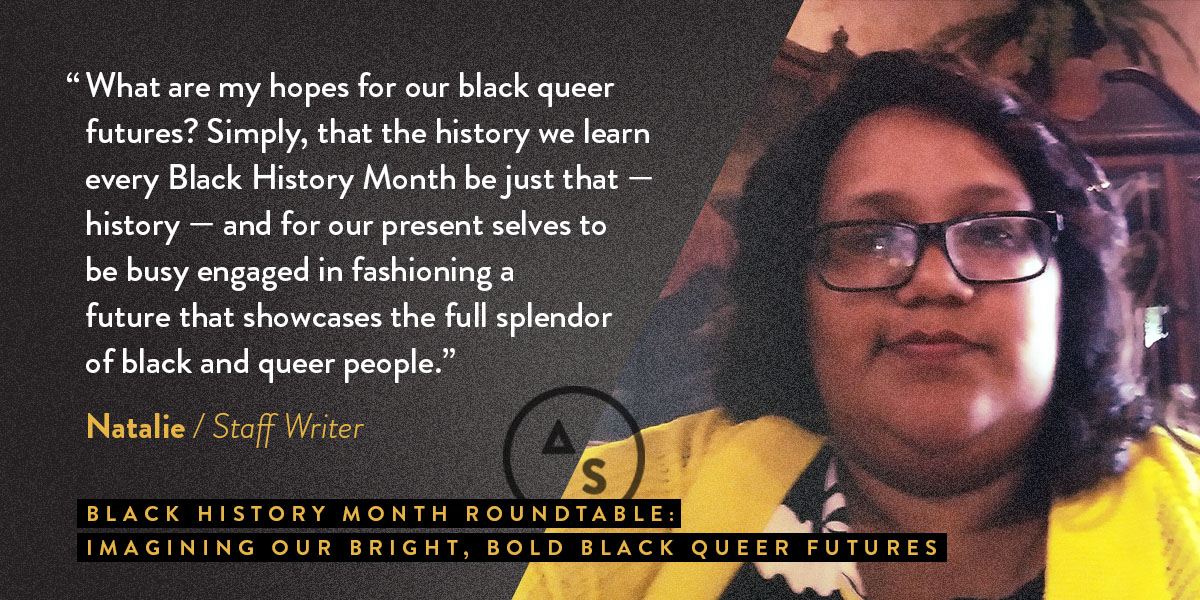
What are my hopes for our black queer futures? Simply, that the history we learn every Black History Month be just that— history— and for our present selves to be busy engaged in fashioning a future that showcases the full splendor of black and queer people.
I just want for us to have gotten to Dr. King’s mountaintop and have that be the end of it. The fight to be finished, consigned to the history books. But instead, so much of our energy is consumed having to fight battles that should’ve already been won.
I want to spend my time deciding between which candidate would create the best world for me and my family, without jumping over a dozen hurdles to cast my ballot or having that ballot weakened by political and racial gerrymandering. That was supposed to be history.
I want to spend my time finding a career that I love that allows me to be my whole self without fear of discrimination. That was supposed to be history.
I want to build a home in a great community without fear that I’ll be tossed out by my landlord or have the neighbors call the cops on me for entering my own home. That was supposed to be history.
I want black children— perhaps, one day, my own— to have access to fully funded, quality schools without having to leave our own communities. That was supposed to be history.
It was all supposed to be history. It was supposed to be this thing we talked about once a year, in February— a reflection of how far we’d come. But, as William Faulkner once wrote, “the past isn’t dead, it isn’t even past.”
Back in 2015, following the murders of nine black people in Charleston, SC by a white supremacist, Bree Newsome and a group of activists gathered in Charlotte, NC to talk about protest actions. The group, compromised of “both black and white, who represented various walks of life, spiritual beliefs, gender identities and sexual orientations,” had already toyed with the idea of taking down the Confederate flag that flew over the South Carolina capital. On that day, they started to develop a more concrete plan. Bree would be the person to scale the pole and take it down, but Jason Tyson helped her get there— from practicing with her on the light post at his farm, to acting as her safety as she climbed on the day of the action.
Jason Tyson could’ve scaled that pole just as easily, but he didn’t. Instead, he empowered a black woman to bring down this symbol “of systemic oppression and racial subjugation.” He used his privilege to support her voice, not supplant it. At that moment, he was the perfect embodiment of the type of allyship we should all model ourselves after.
Be the person who is not content to be woke on the sidelines. Be the person that shares their knowledge and empowers others with it. Be the person who gives up their space so that others get a seat at the table. Be the person that recognizes the difference between being silenced and choosing to be silent. Be the person who uses their privilege to ensure the safety of those who lack both. Help us all get free.

Thank you
I feel breathless right now. Every last word in this post is gold and inspirational! Thank you so much!
I love this so much. Thank you, all of you. Goddamn I love this.
Thanks again, @c-p, for putting this together and giving us a space to talk about these issues.
And thanks to all the other staffers who shared their perspectives.